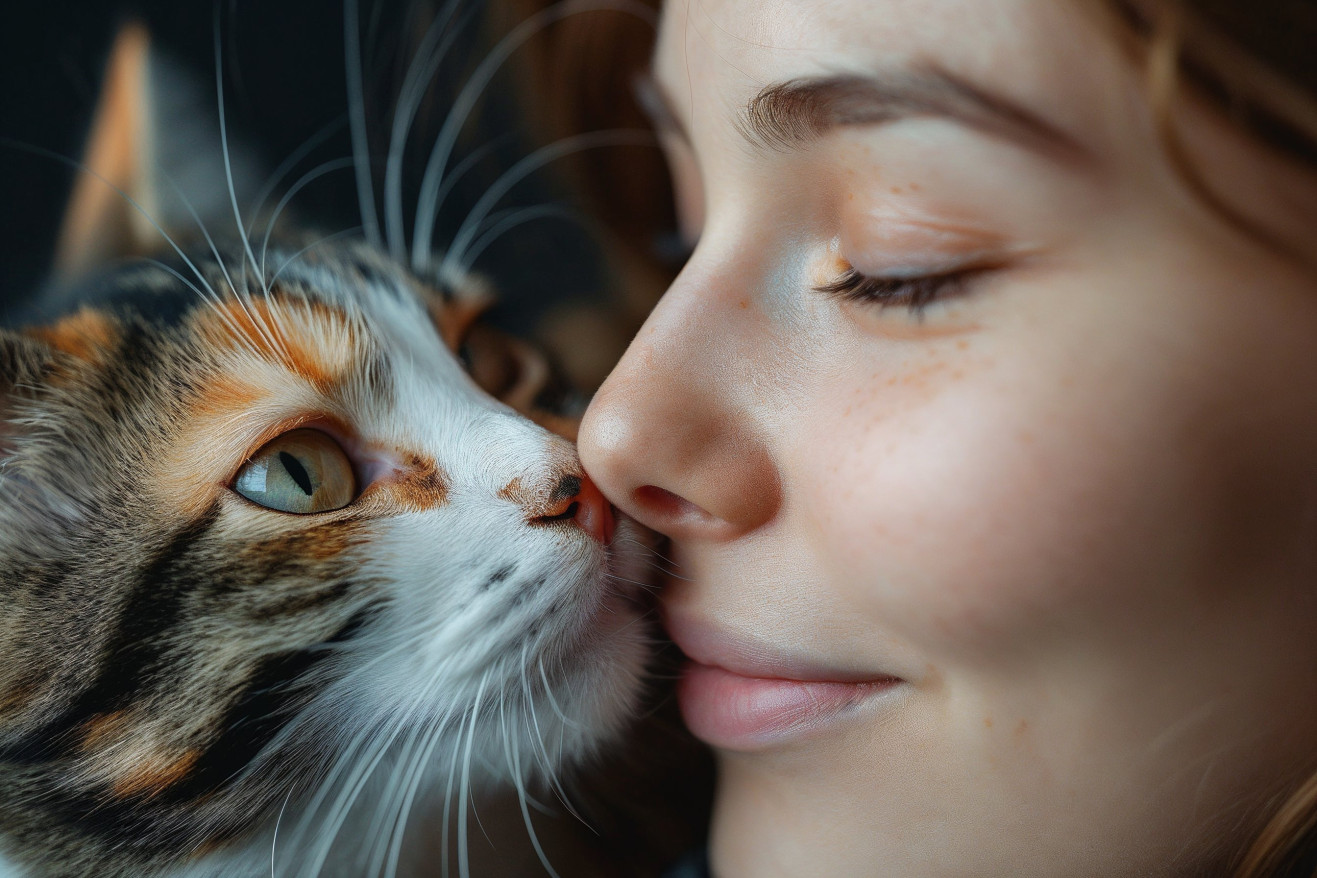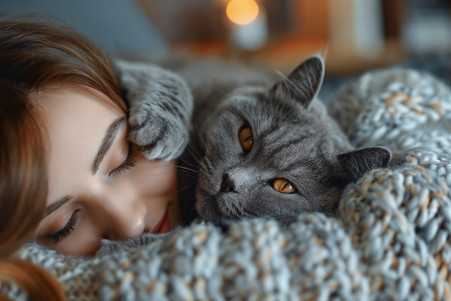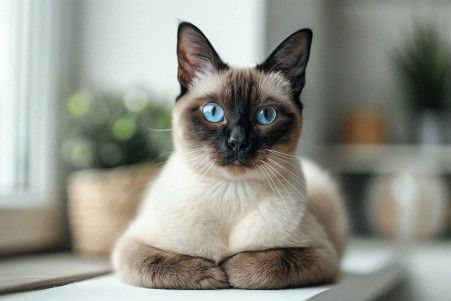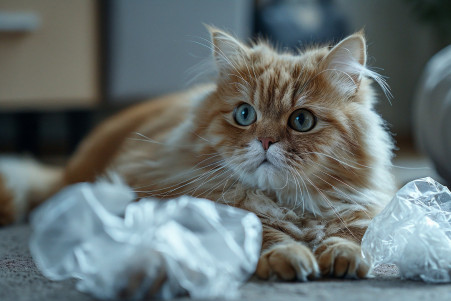Why Does My Cat Eat My Hair? Unraveling Feline Behavior and Health
8 February 2024 • Updated 7 February 2024

Cats are notorious for their strange behaviors, but what makes some cats want to eat human hair? Cats may eat human hair as a form of affection, similar to allogrooming, or because of stress, attention-seeking, and pica—a compulsive eating disorder. If the behavior is happening regularly, it may be a sign of nutritional deficiencies or health problems, and you should consult a vet.
We will get to the bottom of why cats eat human hair by drawing on veterinary knowledge, behaviorist studies, and nutritional research. By combining information from these fields, we hope to give you a well-rounded understanding of feline behavior that includes both natural grooming instincts and potential medical issues.
In the process, you’ll learn everything you need to know about why your cat might be eating your hair and how to address it to ensure your pet’s well-being.
Why does my cat eat my hair?
The Science of Cat Grooming: From Cleanliness to Connection
Cats are known for their cleanliness, spending up to half of their waking hours grooming. While this may seem excessive, grooming is about more than just keeping clean. It’s also an important part of a cat’s health.
Grooming helps keep a cat’s skin healthy by stimulating the production of sebum, which is then spread over the fur to protect it, according to The Spruce Pets. Grooming also helps cats stay cool, as the saliva they leave on their fur evaporates and cools them down.
Allogrooming, or mutual grooming, is a form of grooming that takes this to the next level. It’s an intimate social behavior that cats typically do to each other’s heads and necks, and it helps cats bond and show trust. A study in the Journal of Ethology even shows that mutual grooming can be a way for cats to keep the peace in a group.
When your cat licks your hair, it’s doing this to you, showing you that it loves you and considers you part of its ‘family.’ However, this can also lead to your cat eating your hair.
While grooming is an important part of a cat’s life, a study in the Journal of Ethology shows that changes in grooming behavior can be a sign of stress or an underlying health issue. So, paying attention to your cat’s grooming habits can help you understand how it’s feeling and when you may need to look into its emotional state further.
Why Do Cats Eat Hair?
The reasons why cats eat hair can be complex, but it’s often related to stress or anxiety. Stress and anxiety can have a huge impact on a cat’s behavior, leading to everything from hiding to the strange behavior of eating hair.
Blue Cross lists some of the most common signs of stress in cats, which include changes in eating habits, excessive vocalization, and hiding—symptoms that can eventually lead to eating non-food items. Stress can be caused by environmental changes like moving or construction, as well as social changes like new family members or pets.
Recognizing that your cat may be experiencing stress is the first step in helping them overcome it, as Cats Protection explains. Ways to help your cat overcome anxiety include making sure they have a stable environment, getting enough playtime, and even considering pheromone diffusers. In more extreme cases, a certified cat behaviorist can offer personalized solutions to help you change your cat’s behavior.
That said, if your cat is eating hair on a regular basis, it could be a sign of a deeper issue. It’s important to talk to your vet to make sure there are no underlying medical conditions or nutritional deficiencies that could be causing this behavior.
Decoding the Dietary Puzzle: When Cats Eat Human Hair
Cats with pica may chew or ingest inedible objects, such as human hair. This peculiar behavior could indicate nutritional deficiencies or psychological distress. Cats, as obligate carnivores, have a distinct set of dietary needs that, if unmet, could manifest in a search for alternative resources—sometimes human hair.
Cornell University College of Veterinary Medicine advises that a balanced feline diet should include high protein levels, moderate fat, and minimal carbohydrates. A study published in PMC indicates that a deficiency in essential nutrients such as taurine can lead to serious health issues, including retinal degeneration. Additionally, cats require certain nutrients that are not typically found in plant tissue, including specific fatty acids and vitamins.
Evaluating your cat’s diet for nutritional adequacy is crucial, considering VCA Animal Hospitals’ perspective on the evolutionary dietary requirements of cats. If you observe your cat regularly engaging in hair-eating, it is imperative to seek a veterinary evaluation.
Veterinary professionals can offer insights to correct any dietary imbalances and ensure that your cat’s unusual appetite is not indicative of a more serious medical issue. Ensuring that your cat’s nutritional needs are fully met is fundamental to their overall health and well-being.
How to Stop Your Cat From Eating Your Hair: Behavioral Modification Techniques
To stop your cat from eating your hair, you will need to use a combination of behavioral modification and management techniques. This approach is based on positive reinforcement.
As Catster notes, punishment can lead to stress, so it’s better to reward your cat for good behavior. When your cat starts to eat hair, redirect them to a more appropriate behavior or toy. With consistent positive reinforcement and patience, you can train your cat to stop eating hair.
Environmental enrichment is also important in preventing the boredom and stress that can lead to these behaviors. By creating a stimulating environment, as Petcube recommends, you can help your cat find other ways to expend their energy. This can include introducing new toys, cat trees, or interactive play.
Stories from other cat owners show that these methods can be effective. One owner saw a big reduction in her cat’s hair-eating behavior after she increased the amount of playtime and interactive toys in her cat’s life.
Think about things like secure hiding spots, access to outdoor views, and a variety of toys when you’re creating a stimulating environment for your cat. This can help improve your cat’s quality of life, making them happier and less likely to turn to hair for comfort or entertainment.
Why Do Cats Eat Human Hair?
As you can see, the reasons for cats eating human hair are many and varied. Your cat may be using your hair as part of a bonding ritual through affectionate grooming, or allogrooming. Stress, anxiety, and pica are also common causes of this behavior. That said, don’t discount nutritional deficiencies as a potential reason for your cat’s hair-eating habits.
To effectively monitor your cat’s health and well-being, it’s important to pay attention to their behavior. Keep an eye out for signs of stress or changes in grooming habits, which may be a sign of an underlying health problem. If you’re dealing with a chronic or severe case, be sure to consult a professional, as veterinarians can offer helpful advice and support.
In the end, it’s important to make sure you’re providing a healthy, stimulating, and stress-free environment for your cat. By staying on top of things and being proactive, you can prevent odd behaviors like hair-eating from turning into a health problem.
Don’t forget to pay attention to changes in your cat’s behavior and take steps to address the root cause. By doing so, you can help ensure that your cat lives a happy, healthy life.


